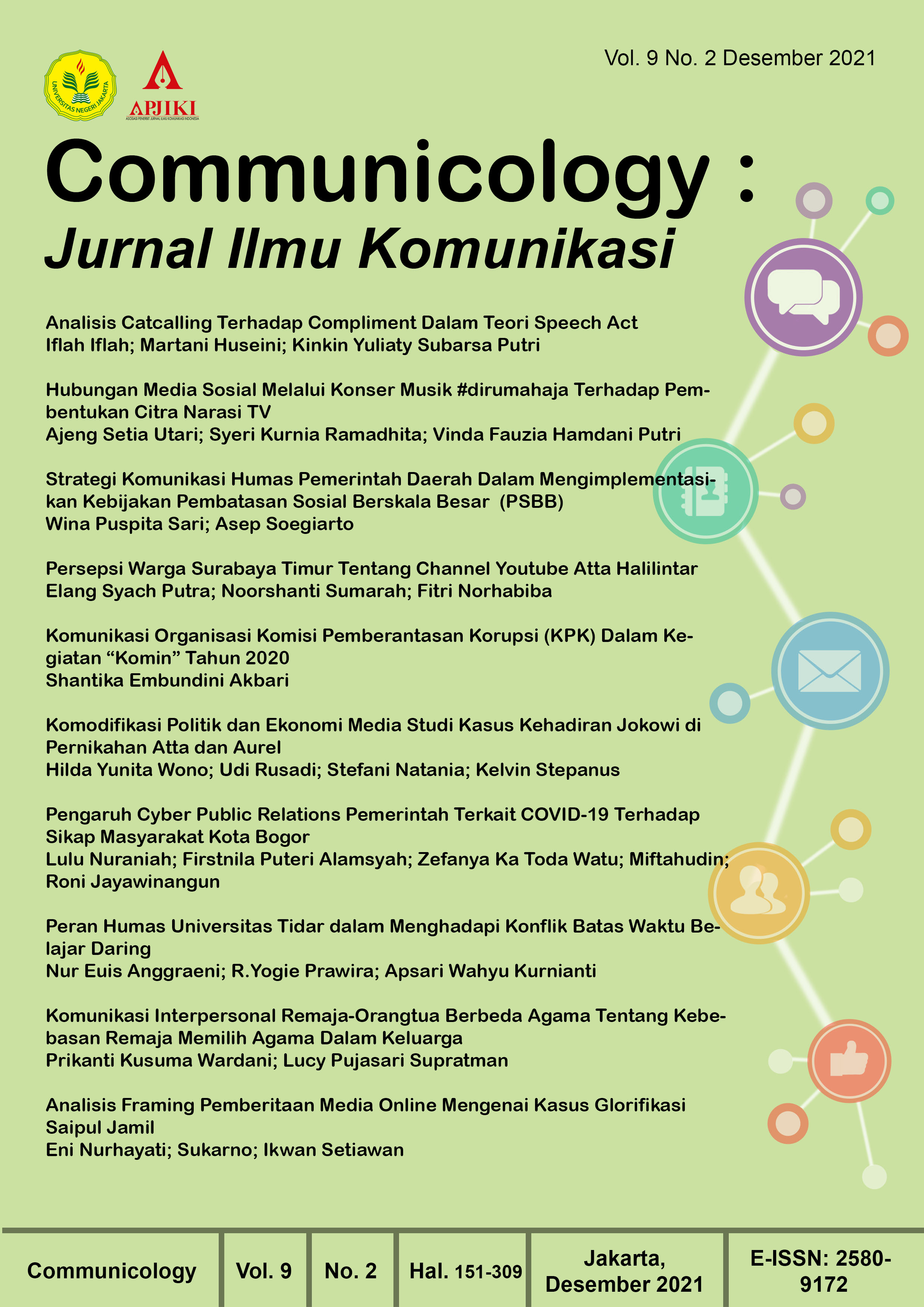Komunikasi Organisasi Komisi Pemberantasan Korupsi (KPK) Dalam Kegiatan “Komin” Tahun 2020
DOI:
https://doi.org/10.21009/COMMUNICOLOGY.022.05Keywords:
Arah Aliran Informasi, Komunikasi Internal, Komunikasi OrganisasiAbstract
ABSTRACT Communication occurs in a given situation, which one is organizational communication. An organization or government’s institution will certainly require communication because It is used as a tool for the smooth running of activities and in order to achieve the goals set by the organization. Corruption Eradication Commission or KPK is a government’s institution whose the main task is to eradicate corruption. As a goverment’s institution, KPK is obliged to always excellent in terms of performance for the interests of the public. Therefore, the Corruption Eradication Commission is realize that the need for concrete steps for enhance employee performance by strengthening coordination between directorates by making an activity called KOMIN (short for Internal Communication) once a month. KOMIN's in practice is very useful to improve coordination among employees, sharing information and education, as far as announcement of the latest conditions of the institution. The purpose of this study was to determine the organizational communication KPK in KOMIN activity. This study is a qualitative case study approach will be described descriptively. Based on the results of participant observation and interviews, the process of communication in the KOMIN activity took place in two-way communication with the direction of flow of information that occurred downward communication, upward communication, and communication horizontally so that the pattern of communication network organization that is formed is a network pattern-free channels (all channels).Keywords: Communication Organization; Directions Flow Of Information; Internal Communication
ABSTRAK
Komunikasi terjadi dalam suatu situasi tertentu, salah satunya adalah komunikasi organisasi. Dalam sebuah organisasi atau lembaga pemerintah pasti akan memerlukan komunikasi untuk memperlancar jalannya kegiatan serta mencapai tujuan organisasi. Komisi Pemberantasan Korupsi atau KPK merupakan lembaga pemerintah yang tugas utamanya adalah melakukan pemberantasan tindak pidana korupsi. Sebagai lembaga negara, KPK memiliki kewajiban untuk selalu menampilkan kinerja yang terbaik bagi kepentingan masyarakat Indonesia. Oleh karena itu, KPK menyadari perlunya langkah – langkah nyata untuk meningkatkan kinerja pegawainya dengan melakukan penguatan koordinasi antar direktorat dengan membuat kegiatan yang disebut KOMIN (singkatan dari Komunikasi Internal) setiapn satu bulan sekali. Kegiatan KOMIN dalam pelaksanaannya sangat berguna untuk meningkatkan koordinasi antar Pegawai, membagikan informasi dan edukasi, hingga pemberitahuan informasi terkini seputar lembaga. Tujuan penelitian ini adalah untuk mengetahui komunikasi organisasi KPK dalam kegiatan KOMIN. Penelitian ini bersifat kualitatif dengan pendekatan studi kasus yang akan diuraikan secara deskriptif. Berdasarkan hasil observasi dan wawancara, proses komunikasi dalam kegiatan KOMIN berlangsung secara two ways communication dengan arah aliran informasi yang terjadi yaitu komunikasi ke bawah, komunikasi ke atas, dan komunikasi horizontal sehingga pola jaringan komunikasi organisasi yang terbentuk adalah pola jaringan saluran bebas (all channel).
Kata Kunci: Arah Aliran Informasi; Komunikasi Internal; Komunikasi Organisasi
Downloads
Published
How to Cite
Issue
Section
License
Authors who publish with this Journal agree to the following terms:
- Author retain copyright and grant the journal right of first publication with the work simultaneously licensed under a creative commons attribution licensethat allow others to share the work within an acknowledgement of the work’s authorship and initial publication of this journal.
- Authors are able to enter into separate, additional contractual arrangementfor the non-exclusive distribution of the journal’s published version of the work (e.g. acknowledgement of its initial publication in this journal).
- Authors are permitted and encouraged to post their work online(e.g. in institutional repositories or on their websites) prior to and during the submission process, as it can lead to productive exchanges, as well as earlier and greater citation of published works.
Users/public use of this website will be licensed to CC BY





